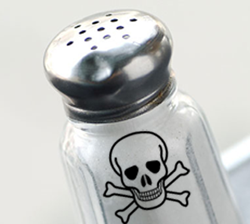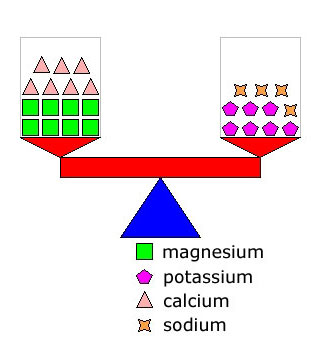




Refusing to cut salt from the diet is not being
a "denier". Sodium's link to hypertension is
based on flawed research. There are better
ways to lower blood pressure.
It’s very likely that the first thought that comes to most people is the constant refrain to cut back on salt. It's hardly surprising; look at any health or medical website and the first tip you're likely to see for reducing blood pressure is to "cut back on salt".
We've been lectured about this for so long, decades in fact, that salt (sodium) has become inextricably associated with high blood pressure.
But is it true? Or could it be that like many things that we’ve heard over and over, it’s just a big fat myth? In other words...
That’s a great question that many people (when they stop and think about it) would like to have answered: I mean, let's say you follow a pretty good diet... do you need to worry about salt?
You see, this whole salt thing has been haunting us since back in the 1970’s, when Lewis Dahl did a study showing that higher salt intake raised the blood pressure of rats in a lab. Of course bad news gets attention and many people took the conclusions of that study at face value and ran with them. But there were serious flaws in the study that were widely overlooked in the zeal to identify a culprit for high blood pressure.
First of all, the rats were fed an amount of salt equivalent to a human consumption of five hundred GRAMS daily. By contrast, the average human salt intake is around 2500 mg (2.5 grams) per day.
And this wasn't the only problem with Dahl's study. Let's just say it was basically flimsy. But despite this...
In 1979 the U.S. Surgeon General’s annual report included a blanket statement about salt and it’s link to high blood pressure, but even this report was a bit iffy on details. Here’s what it said:
High dietary salt intake may produce high blood pressure, particularly in susceptible people.
Unequivocally, studies in genetically predisposed animals show a cause-effect relationship between high salt intake and elevated blood pressure. Studies in man also suggest such a relationship and show, too, that when hypertension is present controlling salt intake can help combat it.
Not the sturdiest of arguments, and when you understand that the “studies in genetically predisposed animals” was based largely on Dahl’s study, it sort of makes you question the word “unequivocally”, does it not?
The shaky edifice that salt prohibition was built on continued to rise, with health professionals always "erring on the side of caution" and the general public eager to accept their edicts without reading the fine print behind them. And so it was that we came to assume that high salt/sodium intake was a major cause of high blood pressure.
The next battle in the war against salt was set to kick off. In 1988 researchers set out to prove Dahl’s “salt hypothesis” with the biggest study ever on the correlation between salt consumption and hypertension. This study took place using 52 population groups spread over 32 countries worldwide and took four years to complete.
But once again, the evidence that came back was less than "unequivocal". It did conclude that part of the Dahl salt hypothesis was correct, that "there is a steady positive correlation between salt (sodium) intake and mean systolic blood pressure (MSBP). Specifically, that MSBP drops 1-6 mm HG for 100 mmol reduction in daily sodium intake".*
*British Medical Journal INTERSALT: an international study of electrolyte excretion and blood pressure: results for 24 hour urinary sodium and potassium excretion, INTERSALT Cooperative Research Group, BMJ, 1988)
But, again, there's a problem with these findings:
Of the fifty-two social groups studied, four were primitive societies whose salt consumption and blood pressure were both extremely low. WITH these four groups included in the data there was a positive relationship between salt and blood pressure. But WITHOUT these four groups, data for the other forty-eight groups showed no relationship whatsoever.
There's more: the conclusions fail to take into account the fact that the four primitive societies experienced less stress, consumed a low fat/high fiber diet, had far less obesity and consumed much fewer processed foods. All or any of these factors could very well have influenced the group's blood pressure and thus the study's findings.
Perhaps the most significant finding of all was that, looking specifically at the other forty-eight groups revealed a small negative relationship: when sodium intakes increased, blood pressure levels went down!
Of course there have been other smaller studies showing that decreasing salt consumption does result in lower blood pressure. But in these cases the results are quite small, hardly significant statistically.
Participants typically see small drops in blood pressure on the order of the 1-6 points systolic achieved through large reductions in salt in the INTERSALT research discussed above. In other words, statistically, you'd have to cut your salt consumption by more than half to expect blood pressure reductions of just a few points.
But even this does not reflect reality as it turns out that some people are more sensitive to sodium variations than others. Such individual differences further complicate research findings; levels of salt that negatively affect one person's blood pressure may have no effect at all on another's.
Of course there's a common sense approach to salt (that applies to most aspects of diet) that should suit all but the most sodium-sensitive...
Nobody still supports the sort of laissez-faire attitude that leads to people thoughtlessly shake salt over every meal before even tasting it.
But the danger of the sort of diet myths and food phobias that have demonized sodium is that they can scare people into severe restriction or even outright prohibition. Just look at the number of fake salt "substitutes" (that are arguably more dangerous than sodium) that have appeared on the market.

Far from being a risk factor, the right balance of
sodium in the body is critical for maintaining lower
blood pressure and good health.
Urging people to severely cut or even eliminate salt from their diet is often to encourage bad health. Low blood sodium levels, a dangerous condition called hyponatremia, can lead to serious health problems and will, ironically, play havok with your blood pressure.
Most people who are not junkfood addicts or compulsive salt shakers can relax. The amount of sodium you consume through natural foods or even an occasional guilty treat should not be a concern.
After all, why fret over fears arising from dubious and inconclusive research? Why focus on changes that can only promise tiny improvements at best, especially when there are so many better, proven ways to lower blood pressure naturally?
Cutting alcohol consumption if you are a regular, heavy drinker can significantly reduce your blood pressure virtually overnight (while moderate imbibing if you are a teetotaler may lower your blood pressure and help protect your heart long-term)...
Exercising as little as 15 minutes a day can quickly lead to blood pressure reductions (not to mention weight loss!)...
Dropping as little as 5-10% of your body weight (if you are overweight) will reliably lower your blood pressure (surely more than cutting back on salt will!)...
Slow, relaxed breathing for just 15 minutes a day is clinically proven able to lower blood pressure by truly significant amounts (plus it will relieve stress, a major contributor to high blood pressure)...
The list goes on and on... And when it comes to eating the most important thing to remember is to think diet, not foods. We hear a lot of hype about both superfoods and taboo foods like salt but you can forget about all that micro-nutrition. Just include plenty of good, natural, whole foods in a balanced diet and you - and your blood pressure - will do fine!
Click here to discover a simple, lifestyle-related technique that can significantly lower blood pressure while enjoying a good, tasty diet with a healthy balance of sodium.
5 The Grange
6 St. Augustins Road
Bournemouth BH2 6NX
United Kingdom
http://www.control-your-blood-pressure.com
(1) 877-435-1985
Contact
Us
info@control-your-blood-pressure.com
Toll Free (877) 435-1985
My
Natural Health Blog
 Follow Us via RSS
Follow Us via RSS
Home
The
"System"
Demo
Product
Features
Clinical
Trials
Real-Life
Results
Articles
Videos
FAQ
About
Contact
Us
14525 SW Millikan Way #36650
Beaverton, OR 97005-2343
United States
http://www.control-your-blood-pressure.com
Toll Free: (877) 435-1985